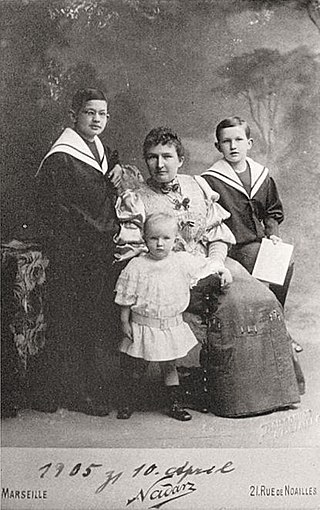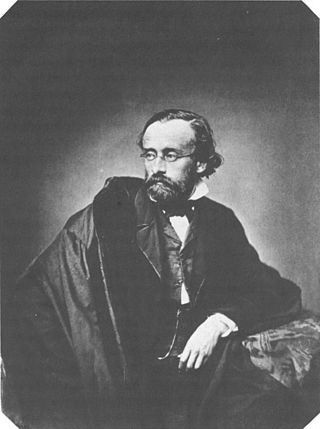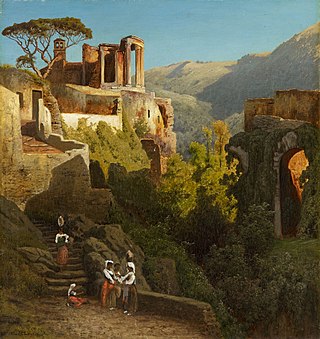This article relies largely or entirely on a single source .(October 2020) |

Wilhelm Lichtenheld (13 October 1817, Hamburg - 25 March 1891, Munich) was a German landscape and architectural painter; known for atmospheric evening and nighttime scenes.
This article relies largely or entirely on a single source .(October 2020) |

Wilhelm Lichtenheld (13 October 1817, Hamburg - 25 March 1891, Munich) was a German landscape and architectural painter; known for atmospheric evening and nighttime scenes.
He was the son of an actor at the Hamburg Stadt-Theater. Inspired by his father's theatrical work, he originally planned to be a stage painter and took drawing lessons from an older brother.
In 1839, he studied at the Academy of Fine Arts, Munich. He was able to study there for only one year, so he completed his artistic education by copying the Old Masters at the Alte Pinakothek. He also began creating his own original works; genre scenes at first, then romantic landscapes with staffage, often painted by moonlight.
He became a member of the Kunstverein München in 1840, and began participating in their exhibitions. Later, he took a study trip to Italy and visited Venice.
His activities and interests were wide-ranging, including botany, fishing, hunting and gymnastics. He was also an avid collector. On numerous occasions, he performed as an actor, in local festivities. His seventieth birthday was a public celebration.

Oswald Achenbach was a German painter associated with the Düsseldorf school of painting. Though little known today, during his lifetime he was counted among the most important landscape painters of Europe. Through his teaching activities, he influenced the Kunstakademie Düsseldorf. His brother, Andreas Achenbach, who was twelve years older, was also among the most important German landscape painters of the 19th century. The two brothers were humorously called "the A and O of Landscapes".

Max Liebermann was a German painter and printmaker, and one of the leading proponents of Impressionism in Germany and continental Europe. In addition to his activity as an artist, he also assembled an important collection of French Impressionist works.

Charles Crodel was a German painter and stained glass artist.

Wilhelm Trübner was a German realist painter of the circle of Wilhelm Leibl.

Claus Friedrich Bergen was a German illustrator and painter, best known for his depictions of naval warfare in World War I.

Ernst Wilhelm Nay was a German painter and graphic designer of classical modernism. He is considered one of the most important painters of German post-war art.

Carl August Heinrich Ferdinand Oesterley was a German landscape painter who eventually specialized in scenes from Norway.

Bernhard Studer was a Swiss landscape painter.

Thomas Ludwig Herbst was a German Impressionist painter; known mostly for landscapes and animal portraits.

Adolph Friedrich Vollmer was a German landscape and marine painter and graphic artist. He and his contemporary, the painter Christian Morgenstern, were pioneers in Hamburg of early Realism in painting.

Ferdinand Kobell was a German painter and copper engraver.

Eduard Schleich was a German painter. He is generally referred to as The Elder to distinguish him from his son Eduard, who was also a painter.

Julius Lange was a German landscape painter.

Elimar Ulrich Bruno Piglhein was a German sculptor and painter. He was a founder and first President of the Munich Secession.

Hermann Kauffmann also Herrmann Kauffmann was a German painter and lithographer, and one of the main representatives of the Hamburger Schule.

Wilhelm Dürr the Younger was a German painter and draughtsman, as well as a professor at the Academy of Fine Arts in Munich.

Carl Jungheim was a German landscape painter, associated with the Düsseldorfer Malerschule.

Dietrich Langko was a German landscape painter; especially known for his winter scenes.

Ludwig Gustav Voltz was a German landscape and animal painter. He also did illustrations.

Johann Heinrich Höfer was a German landscape and portrait painter.